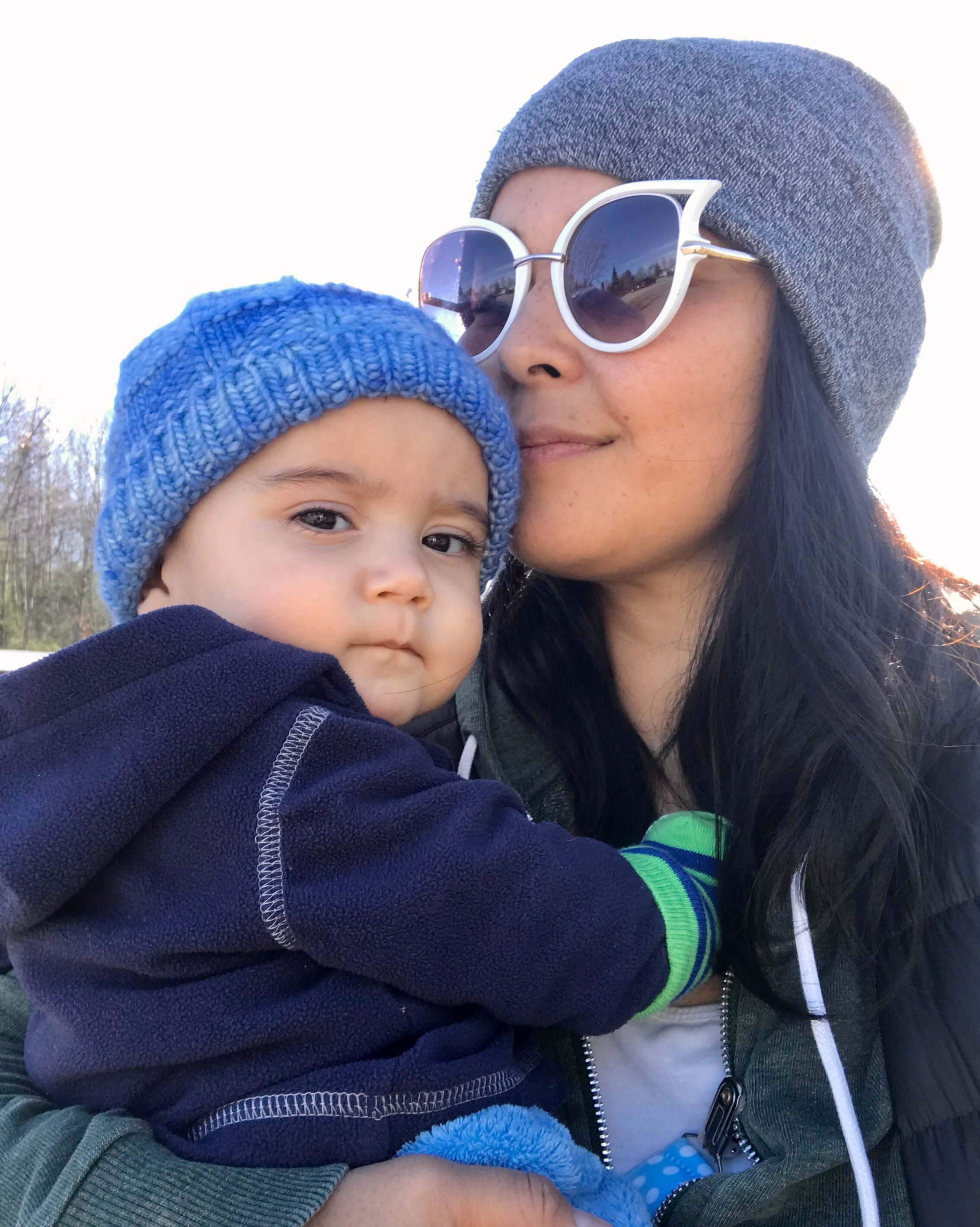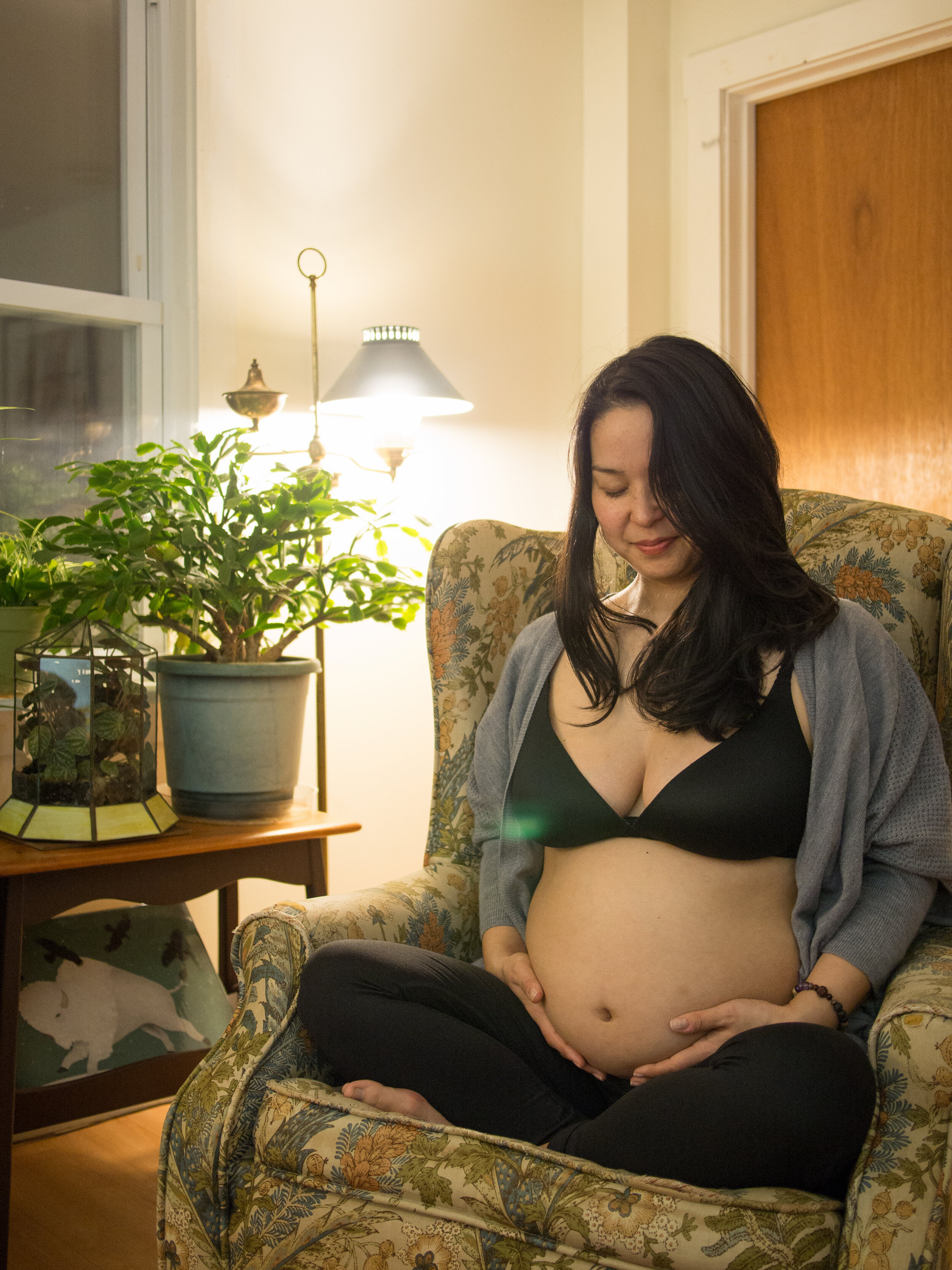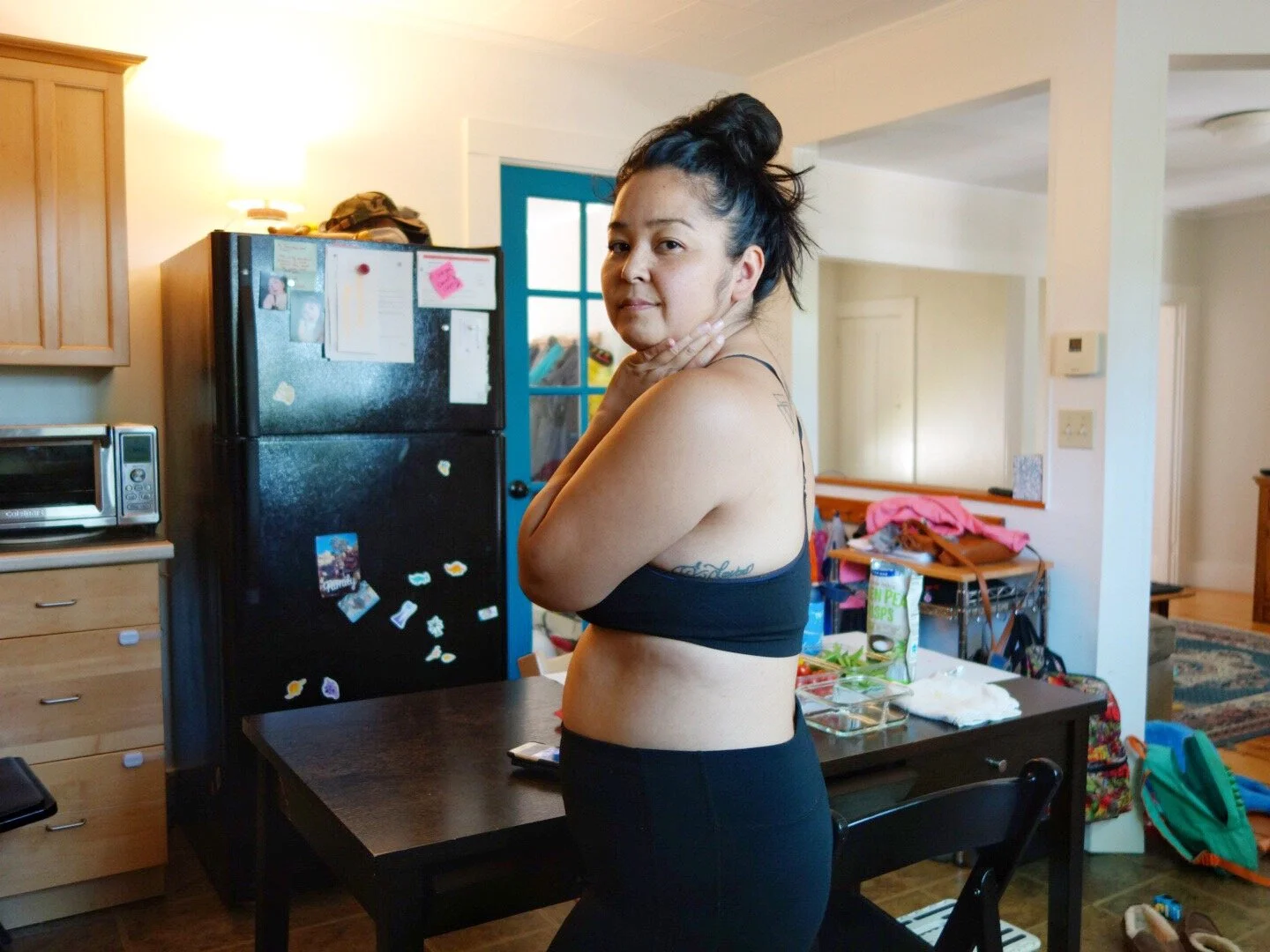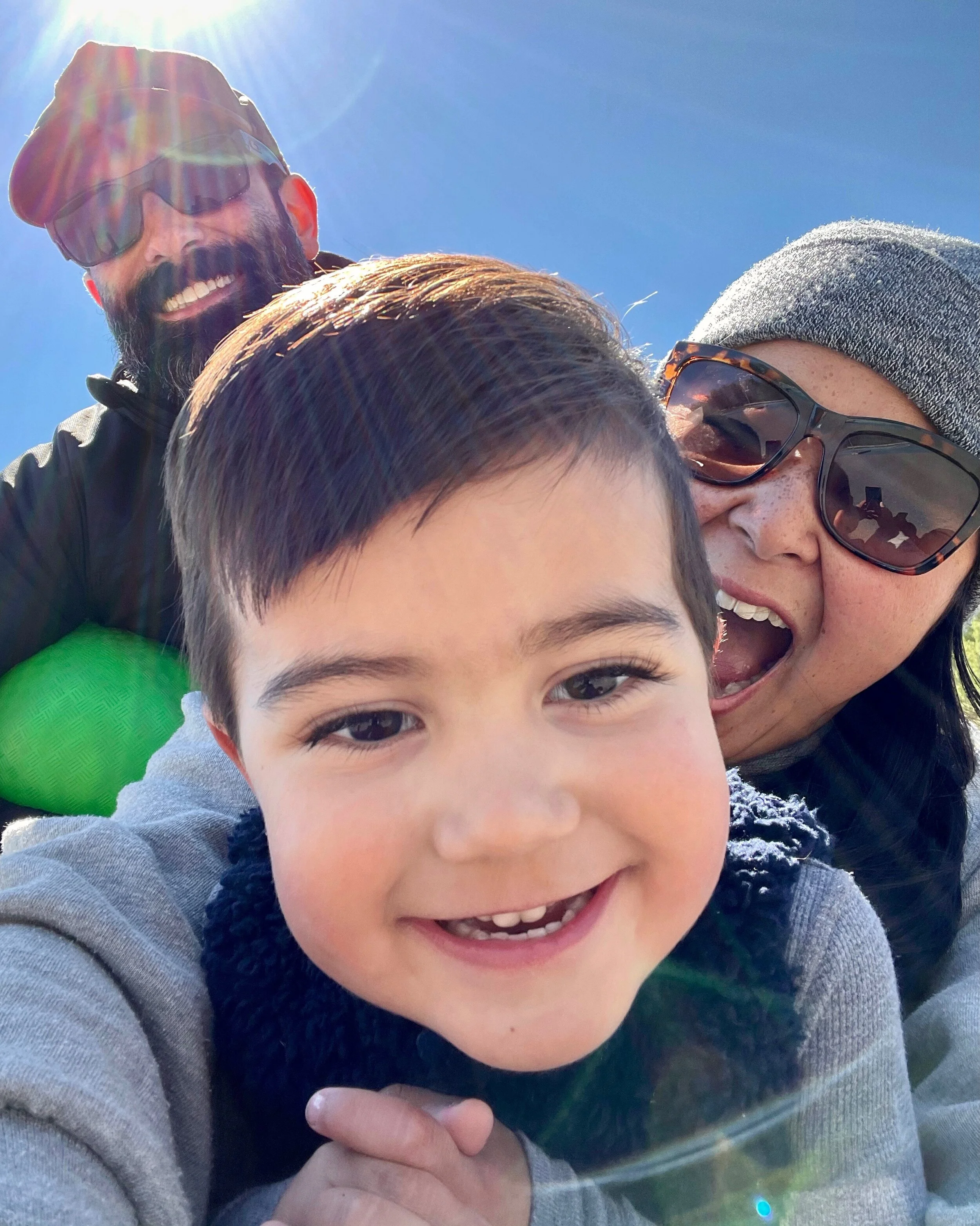Motherhood & Mental Health
Miscarriage, Depression, Parenting a Toddler, and Feeling Whole Again
Before you read, please acknowledge: I am one person with this one experience. I do not speak for all mothers or anyone else experiencing depression. Every situation is unique. My son is 3 years old and this is our experience so far. I have the privileges of growing up knowing the importance of mental health, current good physical health, a co-parent/partner, stable housing, flexibility of my own work schedule, health insurance that covers the cost of therapy, out-of-the-house childcare and enough recent years spent living out of survival-mode that afforded me the embodied belief there was something beyond my depression. This is not (and was not) always the case. There is always more complexity, nuance and history than can fit into one blog post.
Please honor this as a tiny snapshot of my experience and extend respect and compassion to your unique circumstances + capacity as you read on. 🖤 Amy
I felt broken.
Not sad, not angry, not even numb but broken -- like I had a part missing or malfunctioning.
For a while I thought the missing part was the desire to be a mother at all.
I was never fully committed to the idea. With my family history, my mother wounds, all the expectations of motherhood and having just finally (after 33 years) created space in my life to prioritize myself over anyone else, a shift to motherhood seemed very unappealing.
But nature had other plans.
Dan and I had talked about having a family “someday” but the day when my IUD was still implanted and an emergency ultrasound was telling us I was 8 weeks pregnant — was not that day.
After that ultrasound we had a procedure to have the IUD removed, many more conversations about becoming a family and then at 14 weeks, the amniotic sac ruptured and I had a miscarriage.
I tell this story now, quickly, leaving out most of the details with the distance of 4 years and lots of intentional, intense healing. To sum up the depth of that experience into any number of words is literally impossible.
After the miscarriage, I actually felt some relief. It all happened so fast and we hadn’t planned for any of it —this felt like a moment to catch our breaths again.
a small triangle tattoo to honor my first pregnancy
But, it also felt like I failed — as a mother and as a woman. I couldn’t keep a baby alive. I wasn’t capable of such a “natural” part of life.
I say “natural” and I mean the narrative of what is “natural”. It’s subjective. It’s constructed. It does not apply to really anything in modern times. Thanks largely to Jessica Zucker and her @ihadamiscarriage campaign, I learned that 1 in 4 pregnancies end in miscarriage — for all kinds of reason. There aren’t always predictors or ways to avoid it. In some ways, miscarriage might be one of the more natural parts of the motherhood journey.
I let grief rule my world for the couple weeks after the miscarriage. I was ultra positive with anyone that asked how I was doing but crying most other hours of the day, afraid to leave the house because I didn’t think I’d be able to hold it together.
I was in shock in so many ways.
After the miscarriage, I didn’t get another IUD and didn’t want any hormonal birth control. Dan and I agreed we’d “see what happens” with getting pregnant again.
This feels awful to say but in some ways, I wanted to get pregnant again to prove I wasn’t a terrible person and I could be a good mother. I didn’t want to feel like a failure.
But I was also still wrestling with actually bringing a child into this world. A world at the time that felt tense and confusing. It was 2017, I am Asian American, the daughter of immigrants with “progressive” views and deep empathy for the collective — if you consider who was president then, the tension was unavoidable.
During that time I released a lot to the universe. Letting myself flow through all my emotions. Letting all the intentions and motivations and dark, dark shadows be real. I was grieving and healing.
When it felt right, I looked at where I was, what I wanted, what we could give to a child — we were in a good place and things made sense.
Three months later, I was pregnant again.
During my pregnancy, I emotionally prepared A LOT.
I had a mindfulness coach and a breathing practice. I had friends I talked to all the time about birth and self-care in the newborn stage. I stock-piled snacks and got prenatal massages. We talked about Montessori philosophy, Dan’s role in those early months, how after 6 weeks off I would work during Bison’s naps, how I would breastfeed while lounging on our giant orange bean bag, how we’d be extra aware of Postpartum Depression.
Throughout my pregnancy I really focused on the joy and putting things in place to manage the not-joy. I released expectations about the birthing process and trusted so many other things would just fall into place.
Everything was pretty smooth until we left the hosptial.
By day 3 of Bison’s life, most of my self-trust was blown up. Gone.
I second-guessed ALL MY DECISIONS.
I was weighing the pros + cons of literally every moment of his life: waking him up to eat or letting him sleep, formula or painful breastfeeding, bed-sharing or the crib, pumping or resting, setting the room temperature, swaddle or no swaddle, this pacifier or that, too soon for a bottle or not, boiling everything to clean or not, hat outside or not, sunblock or not, checking on his breathing in the middle of the night or not. On repeat. Every day.
And that’s how it continued...from starting solids to comfort nursing to getting him down for naps to childcare to even the type of sippy cup he was going to use.
I didn’t want to set an unhealthy precedent or cause any long-term harm. I didn’t want to coddle him or make him feel neglected. Even though I knew it was not possible, I thought if I tried hard enough I could get it all “right.”
I would ask for Dan’s opinion but then it became a discussion which then became more doubt which then led to reluctant, exhausted decisions on my part.
Over time, those reluctant, exhausted decisions piled up and turned into resentment.
I thought the resentment was mostly about Dan. His capacity and time remained (in my mind) undisturbed by having a child. He went to work, didn’t miss days for no naps or sick days, he could work overtime and not have to let anyone know he’d be late for pickup. He wasn’t worried about meal times or preparing food.
I made my resentment obvious and not productive.
I believed the resentment affirmed my brokenness — that part of me that didn’t want to be a mother.
“I don’t enjoy motherhood, I must be broken”, was the story I told myself. And that made it harder to let go of the resentment.
The brokenness was a part of me.
For a couple years it was just that: a constant, low-grade feeling of brokenness.
I still had great moments but was overwhelmed, frequently crying and feeling more and more disconnected from myself.
I wrote a lot of it off as “adjusting” — to being parents, to our new house, to toddlerhood, changing work responsibilities, the pandemic. I kept thinking, “If we just get through xyz, or if we just do a little more xyz THEN we’ll be in a better place.”
But things kept coming (because spoiler alert: that’s how life works) and no matter how much we did or didn’t do, we were still (seemingly always) in that “adjustment” phase.
At the height of the pandemic, the low-grade brokenness became more frequent frustration and feelings of emptiness.
a big new (home) adventure
Some days I was irritated from the moment I got out of bed in the morning until the second my head hit the pillow at night.
I never had enough time. I felt like I was always rushing, always getting interrupted and never getting anything done.
When I let myself have a moment to rest, I never actually relaxed. I would sit and think about all the things I “should” be doing and how pathetic it was that I couldn’t push myself just a little harder.
I told myself I was worthy of rest — a handful of times I believed it -- but there was still always a voice that said,
“A good mother could do more. A good mother could work and take care of her family. A good mother would not be resentful.”
In those days, if I cried it was primal. My entire being was exhausted, defeated and lonely. SO lonely.
I also yelled a lot, punched (non-living) things and threw stuff.
Bison heard a lot of, “I’m sorry I don’t have it more together today. I’m sorry if I scared you. I’m sorry. I’m so so sorry.”
It broke my heart but I didn’t know what else to do.
I couldn’t find my neutral state. I was sinking and grasping and apologizing — every day.
At one point I was laying on the couch on a Saturday. It was a nice-ish day. Dan and Bison were outside.
I heard Bison laughing — a thing that usually brought me instant joy because of everything his little laugh represented — and I didn’t care.
At that moment, it was just a sound. It couldn’t get it to mean anything. I couldn’t make the connection from him, to me, to joy, to wonder, to curiosity, to safety, to exploration or the future — it was just a sound.
I didn’t move.
I just stared at the wall thinking, “This is what hopelessness is.”
Fortunately (or because intuitive foresight) I had recently found a therapist again (after a 10 year hiatus from therapy). Dan suggested I needed someone to support me in ways he couldn’t and I knew how beneficial it was to have someone committed to listening to me every week.
I got very lucky with the first therapist I found. She does a lot of work with parents/parenting and she was available (a hard thing to come by in the middle of a pandemic).
She was giving me safe space to be heard and validated and giving me some much needed (though not always happily accepted in the moment) perspective.
Every week she assured me I was not alone and it was okay to be struggling. The struggle did not mean I was broken or a bad mother, it only meant I was struggling. She’d offer ways to address the struggling — mostly related to dropping my own expectations of myself and Dan and setting firmer boundaries around my self-care — and listen to me reject (because ego) then accept them.
I integrated as much as possible but I was still really far from feeling whole again.
I told her about my descent to hopelessness and asked about exploring (antidepressant) medication. My family has a history with depression and though I tend to keep myself as far away as possible from anything big pharma, I really needed to try something else.
Taking walks, journaling, napping, talking to friends and asking for help with daily tasks was not enough at that point.
I would have really great moments but pretty quickly they’d dissolve and I’d be sitting in the void of hopelessness again.
Hopelessness had become my default. I didn’t know how to shake that.
My therapist pointed me in the direction of someone who could talk me through my medication options.
They both reminded me that medication can be temporary. It can be used for a reset and then can be phased out. This didn’t mean I would be dependent on medication forever. I really needed to hear that.
I’ve been taking antidepressants for a couple months now.
I haven’t felt that vacant, hopeless feeling for a few weeks, at least. (Antidepressants typically take a few weeks to be noticeably effective).
that smile though…
In addition to the medication, these last couple months I also:
Continued talk therapy
Found an acupuncturist
Stopped reading the news first thing in the morning
Got outside more (because winter was ending)
Got vaccinated (marking a hopefulness for community and connection I hadn’t felt for a long time)
Talked to my family more
Saw friends (that feel like family)
Dedicated time to creative projects
Held space for myself to reflect honestly on what I want, what I believe and where I got lost
It is the combination of ALL those things (and many other things not listed) that have been lifting me out of my depression.
It’s one choice that lead to another choice that lead to more choices that eventually built on each other to become a healthier, more intentional, sustainable lifestyle.
Prioritizing your mental health is never about just one thing or finding a quick-fix. There’s no magic pill or one-and-done experience.
The speed and ease at which lifestyle changes are implement depends largely on accessible options and the privilege of time and resources to choose from those options. We do not all have the same privilege, time or resources. The ability to choose is inherent but the options are not always the same. Starting wherever you are with one choice you can make, will still be beneficial. Never judge your starting place against someone else’s.
As Bison approaches his 3rd birthday, I’m settling into the knowing that motherhood itself — caring for, nurturing, teaching and guiding a child — was not the thing making me feel broken or burnt out.
When I am rested, grounded and able to be present, it’s really fun to be Bison’s mom.
It’s the industrial complex of motherhood and ingrained, outdated expectations of motherhood that cause me the most of the tension and heartbreak.
The ways we are taught to not trust ourselves and our instincts.
The ways mothers are pitted against mothers — judging, shaming and criticizing anyone that makes different choices.
And mostly, the ways burnout, overwhelm and overextension in motherhood have become more than badges of honor for a few — they’ve actually become the standard for us all.
Prioritizing your self, your rest and your mental health in a culture that’s all about the harder, better, faster, stronger -- takes courage. It takes commitment. And, it takes community.
The truth is, none of us are alone. Sometimes it feels harder to make the connections (like during a pandemic) but trust that someone out there can relate to what you’re feeling. Someone out there understands — at a cellular level — what you’re experiencing. Someone out there can see you and can relate everything you are doing; everything you are carrying.
Very likely that someone is also moving through motherhood wondering WTF is happening most days.
We need each other.
It’s important to remember, prioritizing your mental health through motherhood (and literally any human experience) is not about feeling good all the time.
It’s about being able to move through the highs and the lows from a grounded, centered, place. It’s about emotional awareness, extending compassion to yourself and being proactive to meet your own needs. It’s about releasing unrealistic expectations before they push you to the point of missing out on laughter and joy.
Sometimes it’s a lot of unlearning and letting go of stories of sacrifice or not comparing yourself to other mothers.
No one is living your life. No one has walked the path you walked. You, your journey/path/process is 100% unique to you — there is literally no way to compare.
Prioritizing your mental health may not look like what anyone else does either. It’s fine! Do you! And just start.
Start with a commitment to find the things that will work for you.
Then try one thing, then another and another until you remember what wholeness feels like (or, start to feel it for the first time).
If you need a jumping off point, here are a few other things that may help you prioritize your mental health in motherhood:
Talk to other people. Motherhood is not a solo sport. You can’t (and don’t have to) do it alone. Find people that can validate your experience AND give you perspective to know the hard days won’t last forever. If a therapist is accessible to you, USE THIS OPTION. They are literally paid to listen to you and offer you perspective. If a therapist is not accessible, find community (in-person groups, social media groups, apps or otherwise), find other mothers, reach out to friends or family. Talking helps. Sharing your story helps. Reaching out is a sign of strength.
Grieve your former self and your old life. It’s natural to miss things you used to have. Even if you love every part of motherhood — things will be different and it’s OK to miss what used to be (especially the sleeping in and the free time). Missing your old life — your old relationship dynamic, your old schedule, your old body — has no reflection on how much you can love where you are right now. Give yourself time and space to acknowledge and honor what has changed.
Take it one feeding at a time. Literally every day is different. Especially in the early years, as soon as you think you’ve got a new routine down, BOOM, the child(ren) will change it. When Bison was a newborn we struggled with breastfeeding. Most days we reminded ourselves to take everything “one feeding at a time” — if one feeding was good, awesome. If the next feeding wasn’t, then we’d adjust it. We let each experience sit on its own (vs. beating ourselves up for not keeping up with progress). In toddlerhood, this is still so helpful and so true.
Take the extra 5 minutes. I was a rusher. I rushed through everything (even when I had support) because I thought I needed to be with Bison as much as possible. I rushed cooking, eating, brushing my teeth, taking showers, getting ready, breaks, naps, errands. Anything I did alone to take care of myself, I rushed. Once I realized what was happening, I started to enforce an extra 5 minutes. When I didn’t have a hard stop to my alone time, I waited out my sense of urgency for 5 minutes. I set a timer and let myself have that extra 5 minutes before getting back in the mix. And (not) surprisingly, nothing fell apart in those extra 5 minutes. No lives were ruined and I actually felt happier to get back to Bison.
Make a list of EVERYTHING you do on a daily basis. It’s a FACT that you never have to earn your rest or prove you’re worthy of a moment to care for yourself. But, if you’re someone that’s hard on themselves for not getting enough done or always feels like they can/should be able to handle more, make a list of all the things you do every day and the time spent doing them. Not just the tangible task-based things (cooking, cleaning, laundry, etc), list out the emotional support, other jobs, researching, planning, scheduling, healing -- all of it. Use the list to remind yourself that constant output requires time to reset and recharge. Your energy is not endless.
Use screen time as a tool. I was definitely one of those, “I would never let my kid be in front of a screen so much!” people…until I had a toddler. When I finally accepted screen time as a tool — not as something rotting Bison’s brain or making me a terrible parent — everything became easier. To get there, I listed out the benefits of screen time for us. A few of them were: exposure to creative arts (animation, storytelling, etc.), education, physical closeness (we’d sit on the couch together and watch), physical rest, feeding the imagination (Bison’s and mine —I’ve had a lot of brilliant ideas sparked from kids shows). Whenever we had reached that point of interacting exhaustion, I’d suggest a show. We’d set a timer and/or we’d decide when we were both rested enough to engage with each other again. It’s all about balance.
Release guilt for actions taken in survival mode. The frozen meals, the takeout, the extra screen time, the sugary snacks, the yelling, the extra long “stay-in-your-room-and-rest” times. Sometimes you do things because you just need to get through the day. The handful of times they happen will not ruin your kids (or how they see you). Give yourself grace and compassion. Release the guilt. These times will pass.
(Re)Build trust in yourself and your decisions. There’s no way to get it all “right.” And on the flip side of that, there’s no way to really get it wrong (outside of abuse, neglect, etc.). There are infinite ways to do motherhood and infinite opinions on what is “right.” When you feel afraid to do something “wrong”, get off Goggle and turn inward. Listen to what feels right to you, for your child. Then, if you need it, almost for sure you will be able to find a source to validate your choice.
Explore alternative therapies and medication (if they are accessible to you). At first medication was hard for me. It felt like I was giving up or like I wasn’t strong enough to pull myself together. In reality though, medication is like any other tool. It can be used when you need it and stopped when you don’t (with assistance from a professional). It is not a quick fix but it may help you reset and get back to neutral much quicker.
Accept the bad days. They will happen. You will yell. You will cry. You will inevitably do or say something you wish you didn’t. Your kids will inevitably do or say something they wish they didn’t. It happens because we’re human. That’s part of the ride! Cultivate a space that allows you (and your family) to accept these days — without judgement or shame — and then reflect on how you can choose differently the next time. The bad days will pass. Don’t let them distract you from the goodness though.















